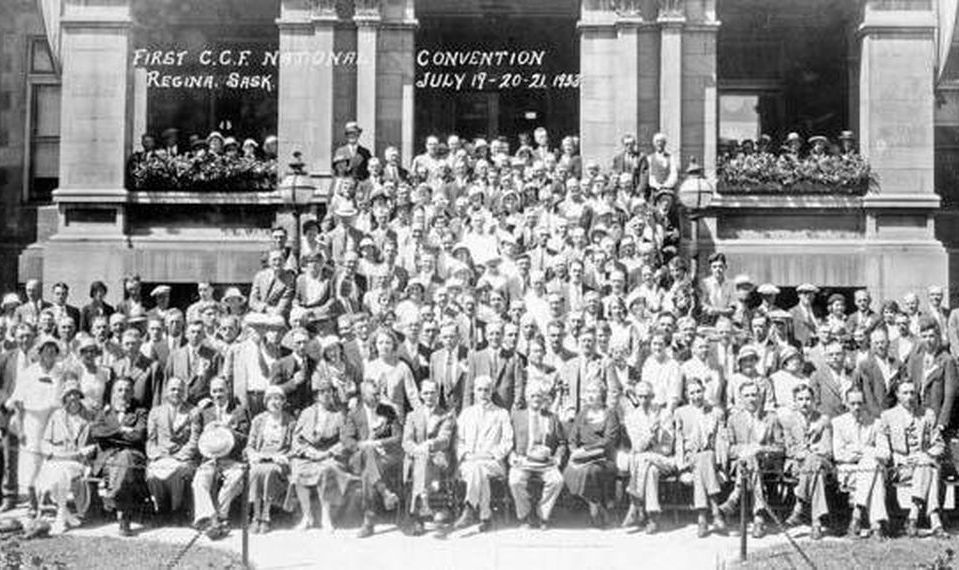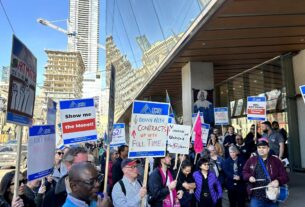This weekend the federal New Democratic Party is holding its national convention. The Liberal government has signalled its intention to call a general election sometime this year, so this convention will say a lot about how the NDP plans to present itself to voters in the campaign. The party leadership would like to focus on the NDP’s role in expanding federal pandemic response programs like the CERB and the CEWS. Their goal is to create the image of a party that can effectively wield the balance of power in a Liberal minority government.
But grassroots groups like Courage who organize within the NDP would like to take an active role in setting party policy. This is, after all, the supposed purpose of the convention. Members of Courage and other young delegates are proposing bold left-wing policy resolutions and calling for more internal party democracy.
Over 400 resolutions were proposed by party members for consideration, and then members voted to determine the order in which they will be considered on the virtual floor. There is no chance the convention will get through all of them, so the result of the ranking vote is crucial in deciding which have any possibility of success.
It’s notable that the top two highest ranked resolutions relate to foreign policy, an area where the NDP has frequently been criticized by the left, and both would be very positive if adopted. The first is a resolution for International Solidarity with Indian Farmers, including a condemnation of the Modi government for their actions in the conflict over farm deregulation. The second is a resolution for Justice and Peace in Israel-Palestine that calls for ending economic cooperation with illegal settlements and suspending all trade in arms with the State of Israel until Palestinian rights are upheld.
There are many other proposed resolutions that would constitute a bold leftwards shift in NDP policy and that Socialist Alternative would support. Great resolutions on the economy include taxing the rich; publicly owned pharmaceutical labs; taking the big telecommunications and major manufacturing companies into public ownership. Resolutions on labour include the universal right to strike for workers; a ban on scab labour; $15 minimum wage; and a 32-hour work week without loss of pay or benefits.
On healthcare, Socialist Alternative would support resolutions to expand universal coverage to include vision, dental, hearing, mental health and better access to reproductive care. For the environment there are resolutions to oppose all new pipelines, to end fossil fuel subsidies, and for free public transit. There is also a “Land Back” resolution to return crown land to Indigenous jurisdiction.
Socialist Alternative would support resolutions to defund the police in order to expand public services and to ban the use of chemical weapons by the police. And on housing the resolutions include a moratorium on evictions due to unemployment and building public housing on federal land to guarantee housing for all.
Even if some of these bold proposals were passed at the convention, they are unlikely to be accepted by the party leadership. According to the NDP constitution, “conventions are the supreme governing body of the Party and shall have final authority in all matters of federal policy, program and constitution.” But the NDP leadership consistently ignores this part of the constitution and reserves the right to ignore any decisions it doesn’t like. As uncovered by members of Courage, out of the 29 policy resolutions passed at the 2018 convention, only 13 actually made it into the official Policy Book before the opening of the 2021 convention. Even if something is NDP policy, it doesn’t mean the party implements it in government. How many BC NDP members are in favour of building the Site C Dam, or using the militarized RCMP to invade Wet’suwet’en territory? Back in the early 1990s, how many Ontario NDP members supported Bob Rae’s introduction of “The Social Contract” or the abandonment of the pledge to nationalize auto insurance.
The lack of internal party democracy is unsurprising given the neoliberal drift of the NDP over the last few decades, along with most of the world’s former social democratic parties. The increasingly careerist and bureaucratic leaderships of these parties are focused on the strategy of moderating their demands in a bid that they think will win power. The NDP stubbornly sticks to this strategy despite its repeated failure. It consistently underperforms in elections except occasionally at the provincial level when there is only a right-wing alternative.
The NDP leadership sees their “supreme governing body” more as an opportunity for choreographed pageantry than a source of democratic accountability. Nevertheless, the NDP leadership ignores its grassroots members at its own peril. If the party continues on its current path, they could lose more seats in the next election to the much more electorally successful Liberal party. This happened in 2015 when Trudeau and the Liberals were seen as offering more radical change than Mulcair and the NDP and the NDP lost more than half of its seats. By turning their backs to the grassroots workers and youth looking to transform the party, they are restricting their electorate to left-wing liberals who in the end will always fall back on the Liberal party to keep out the Conservatives.
The leadership undoubtedly believes that they are the sober and wizened professionals who are just trying to be pragmatic about increasing their seat count in the next election, but they’ve got it backwards. This isn’t the 1990s anymore! Young people today have no memory of the Cold War, and the spectre of Stalinism no longer haunts any party that puts forward clear, bold socialist policies. Especially now in the midst of capitalism’s complete COVID disaster, young people are increasingly losing faith in the system that can no longer provide them with a hopeful future and are searching for radical change and a bold new vision for society.
We can’t underestimate the struggle that will be required to transform the NDP into a party that fights for the interests of the youth and the working class. A complete change of leadership is certainly needed. Jessa McLean is running as a challenger for the party presidency and makes many of the same criticisms of the internal democratic life of the party. But it will require more than the election of a new president. Rank and file members will need to break the prevailing culture and reassert their power to set policy. Policies need to be based on the needs of the working class, the oppressed and ecology, not based on compromise with corporate Canada. The party needs to rediscover how to campaign week after week in communities, rather than just focusing on the election cycle; it needs to have real connections to working people and to fight for their demands.
A 2019 Forum poll showed that 58% of Canadians have a positive view of socialism, including 64% of those aged 18-44, and 85% of NDP voters. An Angus Reid poll published last month showed that half of Canadians want a change in government, but that the Liberal party still has the most support in voting intention. This is an indication of the lack of the opposition parties’ ability to present a real alternative. By failing to step into the political vacuum on the left, the NDP is giving the Conservatives or Greens the opportunity to win over the disaffected people who feel like their voices aren’t being heard, or they won’t vote. If a new NDP leadership mobilized this wave of grassroots energy and the mood of a large part of society with clear socialist policies, they could activate a wide spectrum of young, working class, and Indigenous Canadians, many of whom may not have voted before.
Canada is in desperate need for a mass democratic party of the working class. However, the grassroots energy at this convention is unlikely to be enough to change the entrenched leadership, habits, and mindset that dominates the NDP. As struggles develop, the grassroots, including many dedicated socialists and trade union activists in the NDP, will recognize that they will have to wage a serious struggle to change the NDP and, if that is blocked by the bureaucracy, they will need to build a party that stops seeking to balance between the needs of workers and the greed of capitalists. Socialist Alternative would seek to be an energetic part of such a new party that fights for working people, Indigenous rights and the environment.




